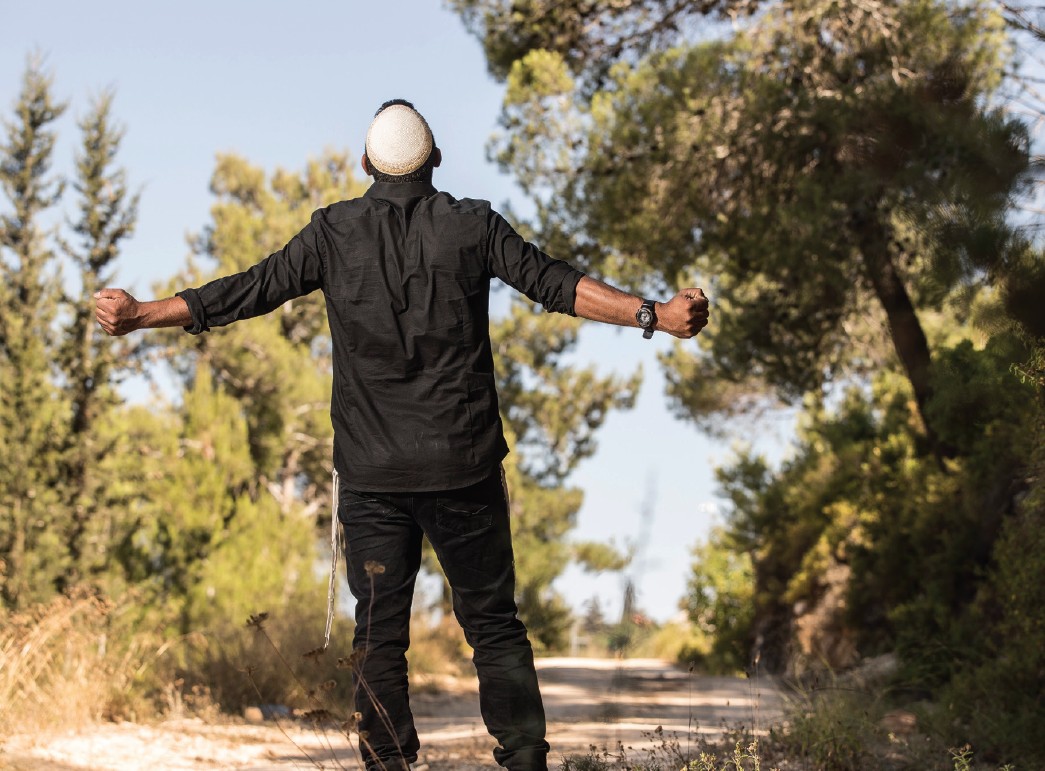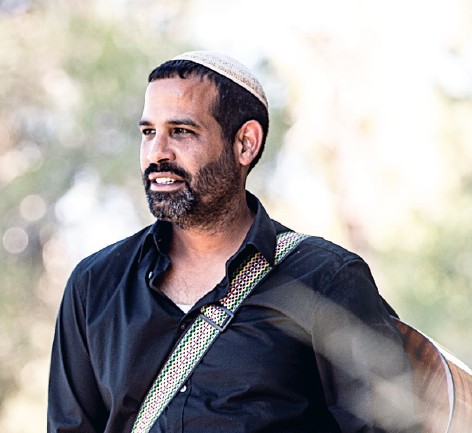Udi Davidi: "Music and Family Are Completely Intertwined for Me"
Udi Davidi's new album, 'High Lights,' marks a return to the lively hits he’s known for. In this exclusive interview, he talks about balancing the two worlds he loves: his home and the energizing stage.

Two days after the release of his new album, 'High Lights,' Udi Davidi's wife, Lilach, received a call from someone insisting on speaking with Udi. Lilach explained that Udi wasn't available. "I have to speak with him," the caller insisted. "He wrote a song about me." Lilach, Udi's partner in creation, was curious which song it was. "The song called 'Shuki.' It's about me! I'm exactly the person described in the song. I'm a veteran businessman, always working overtime, caught in the race. I missed my children's childhood and am trying to make up with my grandchildren. I smoke a cigar and can’t enjoy it. And of course – my name is Shuki."
"I realized there's a Shuki in all of us," says Udi Davidi. "Just a few days after that call, a friend told me he was leaving the army. I asked him why, and he said: 'Because I don't want to be Shuki'... I told him there's a chance he'll still find himself as Shuki – just in a different field. We're all Shuki. I see it in myself. Every night I promise myself that tomorrow, tomorrow I won't be Shuki. But when I wake up in the morning, there's a new Shuki waking up with me. I think it's because of the progress: everything is so fast and easy, and instead of being more relaxed and spending more time at home, we burden ourselves more, trying to achieve more."

Thank goodness for Shabbat.
"Yes, but even on Shabbat you shouldn't be Shuki... not just throwing yourself on the bed, but paying attention to the Shabbat table, the family, the atmosphere. Truly experiencing the rest."
Davidi, a creator and singer who has achieved rare and cross-sector success, admits he often struggles with the costs imposed by the lifestyle of a successful artist. "It’s no coincidence my previous album was 'Waiting for Silence.' This is an album that developed within me for a long time and I really felt I had to write and perform it. The meeting between a big, non-anonymous life and my home is something always in question for me. Who am I? I love the home, the place and the peace it gives me. On the other hand – the stage is part of me and it has an amazing energy. In one way or another, it's a dilemma many face, and I assume that's why we received so many personal reactions to this album..
"The response I remember most is a letter I found on the living room table at three in the morning, when I returned from a particularly exhausting recording day. I was exhausted, hadn't seen the kids all day, felt a genuine crisis. And suddenly, I come home at an hour closer to morning than night and find a letter addressed to me. A letter from a couple stating they were about to divorce but the song 'Everything is Here' brought them back together, and they decided to stay together. That night, I realized: maybe a person wants something in this world, but from above, they put him somewhere else because that's his mission now."
Despite – or perhaps because of – the need to juggle between musical pursuits and family needs, Davidi says his music is directly influenced by his family life. "Music and family are completely intertwined for me. My wife Lilach, of course, is entirely my creative partner. My eldest son is a special child, but when he likes a song – I know I’m okay. I don’t dare record a song he doesn’t like. Harel, the second son, is a talented guitarist and plays with me in performances. He has a very special talent: he’s taken things from me and his mother and transformed them into something unique his own."
Did he play on the album?
"No, because he's studying in yeshiva and can’t make it to recordings. But every piece we recorded was sent to him for review. He's practically my musical critic: 'This chord doesn’t fit, play it differently.' He might be young to be my reference, but he’s always been more mature than me. As a kid, he’d already wake me up for prayer, and I announce to everyone he's the responsible adult."

The musical skills of Davidi Junior often compel his father to act as an arbiter. "We sometimes have debates at home between him and Lilach. Both love complex music, but their styles differ. They can argue for hours over a certain sound – how it should be heard exactly. And, of course, it's something neither of them would notice at all. Usually, I try to reach a compromise between both opinions, and then I must ensure the recording truly is what we discussed. If I didn't do in the studio what we agreed on – there's no point in going home..."
Even the younger children have a role in creation. The hit 'Rejoice with Me' from the new album, for example, starts with a sweet thin voice of a child: "Rejoice with my bride among the faithful, may he receive a blessing from Hashem." The child is none other than Elijah, Davidi’s four-year-old son. "He insisted on being part of this song! It’s a song he loves a lot. Every Shabbat table he goes to hide behind the wall and we have to announce: 'Please welcome... Elijah Davidi!' Then he comes out and puts on a show. After people heard him sing, I received feedback that I still have room to aspire." Another child who participated in the album is seven-year-old Yishai, who appears in the video of 'See My Light' as a child with a guitar. "After we filmed the clip, he said to me: 'I was well behaved in the clip, right? So, I want you to include my favorite song, Hear Our Voice, in the album.' We hadn’t planned to include Hear Our Voice, but Yishai insisted."
During summer vacation, the Davidi children have a special privilege: each can accompany their father to a number of performances. "I love performances," says Davidi simply. "I don’t give automatic performances or use a computer because it wouldn’t let me stop mid-performance and talk to the audience. My audience comes to enjoy, and for me, one of the most exciting things in a performance is remembering how the song was born, how it was naively written and received a melody – and suddenly there’s an audience in front of me singing it. It’s like seeing a song reach maturity. You remember some words written on the couch, and suddenly there’s a song that hundreds of people sing with you. You can really feel the *si'ata d'Shmaya*."
From your place at the peak of Israeli music today, is there nostalgia for the humble beginning, some eight years ago?
"I am a person of nostalgia and love nostalgia, but I can't say I miss what was then. I love what was then, but I also really love what we have today. One of the most exciting things for me in performances, for example, is when the audience sings with me. Today it happens much more than at the beginning. Recently I was at a performance, and suddenly I saw phones in the air – but not with the screen facing me. I didn’t understand – they’re not filming, so what are they doing? After two songs I stopped the performance and asked: 'Guys, can I know what you're doing?' They laughed and explained they’re browsing 'Shironet' to sing the lyrics with me. It’s a completely different feeling when the audience sings with you."

